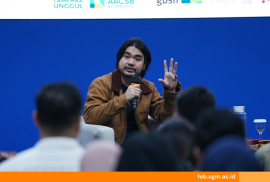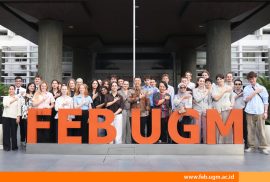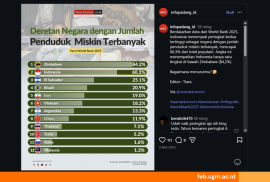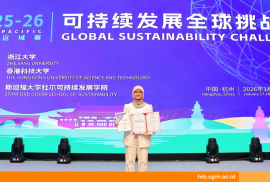When we talk about the world of science and industry, there comes a point that the two always work well together, and at other times they don’t work well together. For this reason, it is important that there is harmony between academics and practitioners in managing the field of Human Resources (HR) and how the field of HR has a real contribution to the industrial world. On this reason, on Friday (05/03/2021), the Management Laboratory, Department of Management, Faculty of Economics and Business, Universitas Gadjah Mada (FEB UGM) held a Management Forum with the topic of “Harmonization of Current Human Resource Management (MSDM) and Demands for Industrial Transformation. in Indonesia”. This seminar was held through Zoom Meetings, and presented resource persons namely Sari Sitalaksmi, Ph.D., Lecturer of the Management Department FEB UGM, and Miftahudin as Deputy Chair of the Permanent Committee for Employment Training, Chamber of Commerce and Industry (KADIN Indonesia). This seminar was moderated by Rr. Tur Nastiti, Ph.D., Lecturer in the Department of Management, FEB UGM.
Sari Sitalaksmi, Ph.D. discusses HR Research Mode-2 Collaboration of Academics and Practitioners. Sari Explains about HR Research Mode-2, namely how the collaboration between academics and practitioners. He explained that there are gaps of field in human resources in Indonesia, these gaps include, among others, the gap in HR Research in Indonesia, Lack of academic research in the HR field but at the national macro level, lack of HR research using an alternative lens of pluralism, Lack of research on the relationship between human resources and human resources. industry from the perspective of HR, as well as research in this field mostly from the disciplines of law, sociology, and politics.
“Singapore invested around 4.5 million Singapore dollars to research 23 sectors of the industrial transformation map, the world of academics and practitioners discussed together what the needs were for the next 10 years,” said Sari.
According to him, if this is lowered further, it will create responsibilities for businesses, universities, and certificates. Therefore, when something changes in Singapore, the industry acts as the supply side, and academia provides the HR needs for the next five years. This is in line with the Management Department of FEB UGM which always looks back at what is relevant to future needs. According to Sari, this is the importance of collaboration between industry and academia.
The next session is an explanation of HR management practices by Miftahudin. Miftahudin started his presentation by discussing the labor aspects regulated by the ILO as one of the concerns, especially for companies that are members of Indonesian Chamber of Commerce and Industry(KADIN) and Indonesia Employer’s Association(APINDO) which are affiliated with foreign companies. The principles set by the ILO are then regulated by labor regulations in Indonesia.
“The issue of HR is an issue that is always there, we have to look for alternatives, if we still rely on resources or the old approach, it turns out that we bring evidence that the old approach has brought us to this point, we have to change,” said Miftahudin.
Miftahudin said that the total population of Indonesia is around 270 million, then there is an estimate that in the future there will be 320 million people in 2035. In this context, according to him, there will be an additional population of approximately 50 million.
“In this case, we discuss productivity, competitiveness, quality of human resources, to make sense, whether with the additional 50 million people, it must be the same as the need,” said Miftahudin.
“In the business world and the industrial world, we are challenged to create jobs accordingly,” added Miftahudin.
Miftahudin also criticized related to productivity, Miftahudin said that productivity is often considered as a result, not as a target to be achieved.
“Our productivity increases by three percent, three percent is enough, less, or too much, we need to define the target, ideally how much of Indonesia’s productivity increase, when we don’t dare to state what productivity target and in the end it is considered a result, then there will be no effort. “, he said.
According to him, this will have an impact on human resources, for that problems that occur need to be identified and how to ensure that research results are not accepted as just given, but must be accepted as what we must do in the future. For that, it is necessary to make careful planning, each sector requires how many human resources, and what kind of quality is needed. To map this, according to Miftahudin, it cannot be left to a person or agency, but must create collaboration between academia and industry.
Reportage: Sony Budiarso




